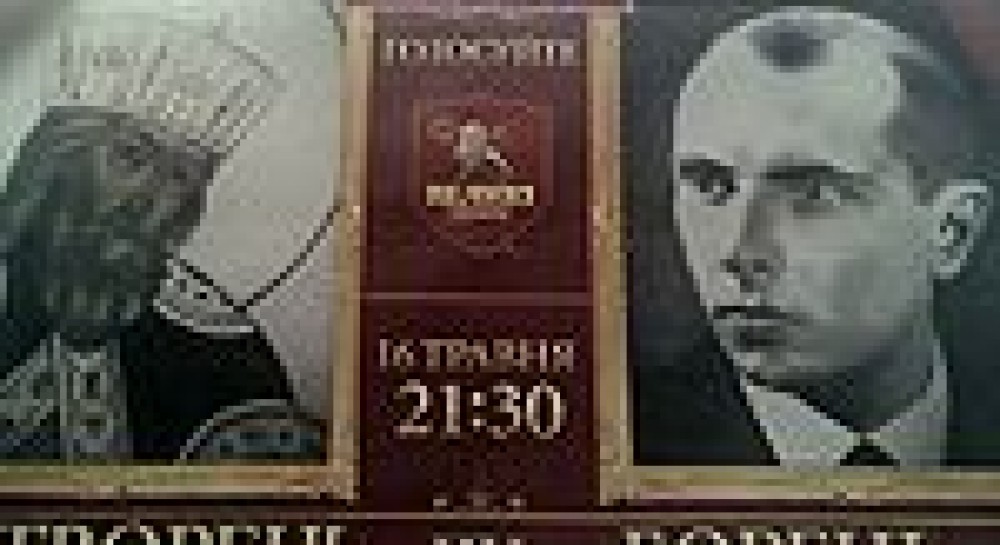
BBC dragged into Ukraine TV furore
A row has broken out in Ukraine over television show "Great Ukrainians". The editor of the show says the vote was rigged in favour of an 11th-Century prince of Kyivan Rus, to prevent a 20th-Century nationalist leader from taking the top slot...
A row has broken out in Ukraine over a local version of the BBC television show "Great Britons".
"Great Ukrainians" came to a climax last month, when the winner was announced to great fanfare.
But now the editor of the show is crying foul. He says the vote was rigged in favour of an 11th-Century prince of Kievan Rus, to prevent a 20th-Century nationalist leader from taking the top slot.
Dozens of Ukrainian MPs have written to the BBC to ask it to investigate.
`Computer rigging`
The argument is being seen in terms of pro- and anti-Russian forces, in a country still deeply divided over its past and future.
After months of voting, on 16 May, TV viewers in Ukraine were finally told who they had voted for as their greatest ever citizen.
The winner was Yaroslav the Wise (983-1054), one of the great princes of Kievan Rus, an empire that straddled present-day Ukraine, Russia and Belarus. But did he really win?
Not according to the show`s editor, Vakhtang Kipiani. He says on the final day of the project, there was a massive spike in the votes for Yaroslav.
"At first we thought it was being done by hand, that there was a group of people sending text messages," he said.
"But now that we`ve seen the figures, it`s clear that it must have been some computer programme, working from a database of telephone numbers."
Mr Kipiani thinks the vote was rigged. He said that he alerted his bosses to his suspicions, but that his warnings were ignored.
On Tuesday 77 MPs signed a letter addressed to BBC Director General Mark Thompson, asking the corporation to investigate the matter.
Mr Thomson`s office is waiting for the letter to arrive before commenting.
Political motive
Ganna Bezliudna, who heads the Inter TV channel that ran the show, denied any suggestion of foul play.
"It`s completely untrue", she said. "We`ve finished this project, and finished it very successfully, we had high viewing figures, and everyone is happy."
Whatever the truth of the matter, Ms Bezliudna is certainly right about one thing: if you look hard enough, you can find a possible political motive behind almost everything that happens in Ukraine, even a seemingly innocuous television show.
In an island of calm amid the traffic of central Kyiv stands the St Sophia Cathedral, with its green and gold onion domes and white walls.
It was built in 1037 by Yaroslav the Wise, and it is considered the oldest standing cathedral in the Russian Orthodox Church.
Andrei Kulikov, a local journalist, told me that, for most Ukrainians who grew up during Soviet times, Yaroslav the Wise symbolises the common bond between Ukrainians, Russians and Belarusians.
And in that sense, this vote was less about the past, than about Ukraine`s future.
Symbolic figure
"There is on the one hand a tendency to look for a separate Ukrainian way," he said.
"On the other hand, there are quite a lot of people who think that we should go into the future hand-in-hand, or at least side-by-side with Russia."
And here is where the other figure in all of this comes into play: Stepan Bandera.
He is the man that Mr Kipiani says would have won, if the vote had not been "fixed".
Bandera was a Ukrainian nationalist, who fought a guerrilla war against both the Nazis and the Soviets, until he was killed by a KGB agent in Munich in 1959.
To many - especially in western Ukraine - he is a hero and a freedom fighter. But to others, Bandera was a terrorist, and a traitor to the Soviet motherland.
Celebrity endorsement
The 10 final contenders for the top slot each had a high-profile "advocate" - a Ukrainian celebrity whose job it was to persuade viewers to vote for their favoured candidate.
Mr Kipiani took on Stepan Bandera. The advocate for Yaroslav the Wise was a high-profile politician from Ukraine`s main opposition party, the Party of the Regions.
During the presidential election of 2004 that led to the "Orange Revolution", the Kremlin favoured that party`s candidate, Viktor Yanukovych.
His pro-Western opponent, Viktor Yushchenko, eventually won, but the country emerged politically divided, between East and West. Many see those same divisions at work in this TV contest.
Savik Shuster, who presented the "Great Ukrainians" show, admits that Stepan Bandera is a divisive figure in Ukraine. But he says, Bandera is also highly symbolic.
Pro-Western youths
"He is a symbol for a young generation that actually feels the independence of the country, wants it to be independent, and sees its future in the West, in Europe."
Mr Shuster said that, despite not being crowned the winner, the very fact that Bandera came so close - the show put him in third place - is a victory of sorts for the pro-Western block, or anti-Russian block in Ukraine.
But not everyone is happy with that. The 77 angry MPs are awaiting a response from Mr Thomson before plotting their next move.
BBC Worldwide, the commercial arm of the BBC that licenses the "Great Britons" format around the world, has in the past said that, while they are happy to give advice on how to conduct a vote, they are not there to police it.
One thing seems clear: the battle to be named the greatest Ukrainian is not over yet.

